The Algae Biomass Organization is helping to build a better future with one of the most promising new technology platforms. We believe algae and seaweed cultivation can improve global sustainability, feed billions of people, and offer new economic opportunity.
Today this industry is seeing major advances and record funding in research, new commercial production facilities coming online, and innovative algae products making waves in a range of new markets.
Join us as we push forward to develop new technology, science, business development, regulations and public awareness about what algae can do. With our current membership drive, you can get discounted rates when you help grow out community:
Corporate Level Members:
- Existing corporate level members will receive a 20% discount on their 2022 membership for signing up new corporate level members.*
- Each new corporate member you recruit will also receive a 20% discount on their 2022 membership.
Individual Level Members:
- Existing individual level members will receive a 20% discount on their 2022 membership for signing up new individual level members.*
- Each new individual member you recruit will receive a 20% discount on their 2022 membership.
These offers expire November 30, 2021.
Your participation in ABO puts you on track to play a role in building a new industry that is perfectly suited to meet the biggest challenges of our times. Be part of our community and invite others to do the same.
Ready to sign up a new member?
Read up on our member benefits and contact ABO’s Barb Scheevel today at 877.531.5512 ext. 1, or email her at bscheevel@algaebiomass.org
New members do not need to be coming in at the same level as the current member. The new member must complete payment by November 30, 2021. Following payment by the new member, the recruiting member will be invoiced for membership at the 20% discounted rate. Payment must be completed by December 31, 2021.
*Each new member will receive the new member discount. Recruiting members will only receive a single discount to their membership rate.

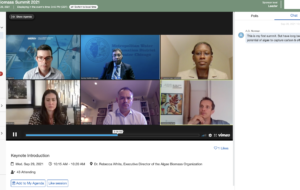 The
The 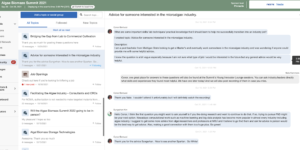 One of the most exciting developments for this year was the increased engagement we saw in the virtual format. Live networking sessions bookended the month-long event, and hundreds of questions and discussion threads were added to the Summit’s online platform. Some sought answers to technical questions, others were interested in tips on how to best prepare for a career in the algae and seaweed industries. In every speaker session a live Q&A allowed attendees to quiz presenters and make new connections.
One of the most exciting developments for this year was the increased engagement we saw in the virtual format. Live networking sessions bookended the month-long event, and hundreds of questions and discussion threads were added to the Summit’s online platform. Some sought answers to technical questions, others were interested in tips on how to best prepare for a career in the algae and seaweed industries. In every speaker session a live Q&A allowed attendees to quiz presenters and make new connections.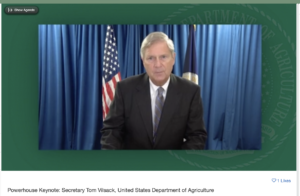 Among the VIP speakers was US Department of Agriculture Secretary Tom Vilsack, who stressed that algae is primed to become a new agricultural sector that can add to global sustainability and economic development. We also saw keynote presentations from Michael Berube, Deputy Assistant Secretary for Sustainable Transportation in the Office of Energy Efficiency and Renewable Energy at the Department of Energy; Marcius Extavour, Vice President of Energy and Climate, XPRIZE; and Trond Helgerud, Seaweed and Clean Label R&D Leader, Managing Director at Dupont Nutrition Norge AS. All spoke about the critical role algae can play in becoming a technology platform with benefits for carbon capture, food, health care, fuel production and more.
Among the VIP speakers was US Department of Agriculture Secretary Tom Vilsack, who stressed that algae is primed to become a new agricultural sector that can add to global sustainability and economic development. We also saw keynote presentations from Michael Berube, Deputy Assistant Secretary for Sustainable Transportation in the Office of Energy Efficiency and Renewable Energy at the Department of Energy; Marcius Extavour, Vice President of Energy and Climate, XPRIZE; and Trond Helgerud, Seaweed and Clean Label R&D Leader, Managing Director at Dupont Nutrition Norge AS. All spoke about the critical role algae can play in becoming a technology platform with benefits for carbon capture, food, health care, fuel production and more. 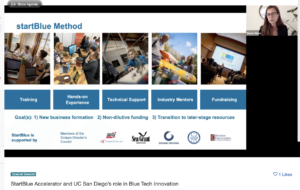 The Summit also included a number of special sessions on its agenda that explored new areas where ABO can accelerate its efforts. One included a presentation from the startBlue Accelerator at UC San Diego that is helping to form more startups focused on ocean-focused solutions to global challenges. Another was a macroalgae focus workshop that brought together seaweed experts of all stripes to explore the state of seaweed research and market development.
The Summit also included a number of special sessions on its agenda that explored new areas where ABO can accelerate its efforts. One included a presentation from the startBlue Accelerator at UC San Diego that is helping to form more startups focused on ocean-focused solutions to global challenges. Another was a macroalgae focus workshop that brought together seaweed experts of all stripes to explore the state of seaweed research and market development. 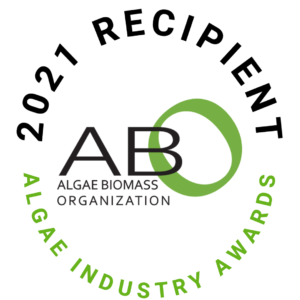 This year, ABO added an additional award, the Pinnacle Award, to recognize exceptional dedication and service, beyond the call of duty, to advance the algae industry. In further recognition of the inaugural winner’s service, the full title of this award will be the Barb Scheveel Pinnacle Award for future recipients. It will be given as the highest honor the ABO bestows on an individual or organization.
This year, ABO added an additional award, the Pinnacle Award, to recognize exceptional dedication and service, beyond the call of duty, to advance the algae industry. In further recognition of the inaugural winner’s service, the full title of this award will be the Barb Scheveel Pinnacle Award for future recipients. It will be given as the highest honor the ABO bestows on an individual or organization.